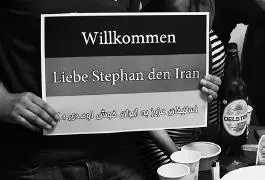“Did you tell them that I work for Der Spiegel ?”
“Of course; they were very interested.”
“Did you also tell them I’m writing a book about Iran?”
“Yes, was that wrong?”
“I don’t know. Maybe the interview isn’t such a good idea.”
Before we go to the after-work party in the afternoon, two other strange things happen. On the street a man in his fifties suddenly shouts: “Stephan! Salam ! How are you?” I recognize his face, but at first I can’t place it. Then I remember. We met in the border town of Hajij, in the evening after our interrogation. Hajij is 260 miles away, and Tehran has a population of 10 million—an incredible coincidence.
Two hours later Setareh shows me a park, where we want to relax a bit. “Hardly any tourists come here,” she claims. We sit on a bench and promptly see a couple on a blanket some 150 feet away who even from this distance look like foreigners.
“Look, tourists!” I say.
She seems seriously surprised. A few moments later there are some drops of rain, and the couple get up and walk toward us.
“Stephan?!” says one of them.
“Clemens?!” I reply. He is a travel blogger touring with his girlfriend, Annette. We know each other from Hamburg. Hamburg is 2,300 miles away, and Tehran has many parks—another incredible chance meeting. Their plane landed this morning, and they plan to explore Yazd, Shiraz, and Isfahan on a two-week vacation. A coincidence like that just has to be celebrated with a beer, so Setareh invites them to the party this afternoon. We buy a pack of candy as a present, and then she takes us up to an office on the fourth floor of a faceless office building. The company sells security cameras. Five cheerful people between twenty-three and thirty greet us with a poster in the colors of the German flag on which is printed Welcome—Love Stephan Iran —and with the music of Rammstein from an MP3 player.

I rather like the imperative implied in the lines. “Actually it should read Dear Stephan, welcome to Iran ,” explains Setareh, as I tell her of its meaning. “It’s much nicer as it is,” I insist.
Two of the people present work here. Now they have called it a day and invited a circle of friends to the office to drink some beer. On the table there are Cheetos and pretzel sticks, on the walls various display models of security cameras, which lend a slightly paranoid atmosphere to the proceedings. “Don’t worry, they’re not on,” says Ashkan, amateur brewer and office worker, on observing my worried look. “Would you like beer or tea?”
His dark beer, served out of a Delster soft drink bottle, is excellent. “Quaffable and full of flavor,” pronounces Annette, who on the basis of her place of birth is the best judge of hop juice of those present—she comes from Franconia. “Every month I make two hundred pints of the stuff. It is a bit stronger than normal beer, about 10 per cent,” says Ashkan. Incidentally, the next party is tomorrow, at the house of Jafar, a bearded engineer who retrained as an architect. He plays piano and is a big fan of the bands Dream Theater and Porcupine Tree. We are all invited.
Suddenly there is a terrific crack, like a shot, and the sound of breaking glass falling to the floor. A windowpane is broken, and some of the slats of the blind are destroyed. For a moment, total silence. Ashkan inspects the damage. “The wind blew a tile from a neighboring roof through the pane,” he says. It is now pretty drafty, so we move the chairs and drinks to an adjoining room. The women disappear to the kitchen and bring back a couple plates of pasta and tomato sauce.
Jafar, the architect, worked for five years for the defense ministry and knows all there is to know about spying and intelligence work. I ask him what he thinks about my forthcoming newspaper interview. “It could be dangerous for you,” he replies. “And for us, as you are coming to us after the interview, and we are having a party. Somebody could follow you.”
Oh yes, I had forgotten: rogue state. There it is again, the fear of getting into trouble with the authorities. I had managed to blank it out. It only came back for one day in Mashhad, when I was applying for my visa. The travel experiences, the happy-go-lucky days on the road, the normality of the daily life with exceptionally warm-hearted people make it easy to forget the dangers.
“You have no idea how professionally the secret services work here, better than in almost any other country in the world. They collect the data of tourists in hotels, bug telephones, and check text messages. Your interview is with one of the biggest newspapers, so a member of intelligence will definitely be listening in. Maybe, directly afterward, you will be invited to another interview. That is not an experience that I would wish on you. Think carefully about it.”
“I don’t think there’s a lot to think about. I’m going to cancel it.”
“That’s very wise,” says Jafar.

HAPPY ENDING
A GALLON OF RAISINschnapps for ten guests may appear to be a bit extreme, but the dealer didn’t want to sell smaller quantities. Additionally, there are two four-gallon plastic containers of Jafar’s home brew beer in a storage room off his hall. Nobody’s going to die of thirst. My flight to Hamburg is arranged for tomorrow, so this is a kind of leaving party.
A clear segregation of genders takes place between the front door and the living room. The men enter and head, more or less directly, for the schnapps container, and the women disappear to a side room for ten minutes to dispose of their headscarves and coats, only to reappear in spectacular dresses.
Jafar has an expensively decorated penthouse apartment, with a stone floor and a magnificent view of the Milad Tower in the evening light.
Dark gray clouds hang above the skyscrapers of Tehran, and on the horizon you can see the flashes of an approaching thunderstorm. From a rooftop on an adjacent building a man appears to be watching us. I quickly redraw the drapes. A number of images of Jesus and crucifixes are arranged on tables and closets. “I am the only person in the clique who is religious,” says Jafar. “But I’m a Christian, not a Muslim.”
He sits at his Korg electric piano and improvises expertly on a rock song. He hands me an electric guitar, and soon we are all singing Adele and Guns N’ Roses songs and a couple voluptuous-sounding Persian tunes. We drink and dance, men with men (“But we’re not gay!”), women with men, women with women—a relaxed circle of friends. It would be easy to forget where we are if there weren’t moments when a sudden melancholy mood descends on the gathering like a dark cloud.
Ashkan is here with his girlfriend, Nazanin. They have been together a couple years. He says that he dreams of being able, once in his life, to take her to a bar and order her a cocktail—in public, in front of everyone. “Is that too much to ask?” I notice that he is close to tears.
Shortly afterward, Jafar returns to the subject of surveillance. He suggests storing all my photos and text files on his computer. “Just in case they are confiscated at the airport. It would be even better if you trashed all photos of parties, military posts, and nuclear plants.”
While I’m transferring forbidden and innocent pictures onto Jafar’s computer, Setareh sits down next to me. “I want to show you something.” She sets up a VPN connection to access blocked websites and types the search term “Happy Tehran” into YouTube. What you can see on the clip closely resembles what is happening in the living room behind us: six young people, three men and three women, are dancing happily to Pharrell Williams’s upbeat hit, F minor, 160 bpm. On the staircase, in the living room, on the balcony with a view of the Milad Tower. Sometimes alone, sometimes man and woman together. Headgear includes hats and headbands but no veils or headscarves. The song’s lyrics talk about freedom and ask you to join in clapping if you feel that happiness is the truth. These words are an invitation to seize the moment, similar to Omar Khayyam’s: “But fill the wine-cup, ere sweet night be gone, and snatch a pleasant moment, while you may.” [1] Khayyam, Omar. The Quatrains of Omar Khayyam. Second edition. Translated by E.H. Whinfield. London: Kegan Paul, Tranch, Trübner, & Co. Ltd., 1893, p. 51.
The poet understood it all nine hundred years ago. At the end of the video clip the names of the “happy” troupe are superimposed, in some cases with last names together with a short message: Happy was an excuse to be happy. We enjoyed every second of making it. Hope it puts a smile on your face.
Читать дальше





![Stephan Orth - Behind Putin's Curtain - Friendships and Misadventures Inside Russia [aka Couchsurfing in Russia]](/books/415210/stephan-orth-behind-putin-s-curtain-friendships-a-thumb.webp)








